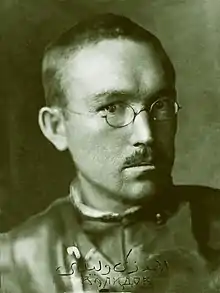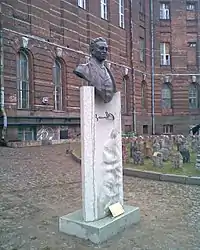Zeki Velidi Togan | |
|---|---|
Әхмәтзәки Вәлиди Туған | |
 | |
| Born | December 10, 1890 |
| Died | July 26, 1970 (aged 79) |
| Nationality | Bashkir |
| Citizenship | Russian Empire, USSR, Turkey (later) |
| Occupation | Historian |
| Signature | |
Zeki Velidi Togan (Bashkir: Әхмәтзәки Әхмәтшаһ улы Вәлиди, romanized: Əxmətzəkiy Əxmətşah olı Vəlidiy; Russian: Ахмет-Заки Ахметшахович Валидов, Turkish: Ahmet Zeki Velidi Togan; 1890 – 1970 in Istanbul), was a Bashkir historian,[1] Turkologist,[2] and leader of the Bashkir revolutionary and liberation movement, doctor of philosophy (1935), professor, honorary doctor of the University of Manchester (1967).
Biography


He was born in Kuzyanovo (Bashkir: Көҙән) village of Sterlitamaksky Uyezd, Ufa Governorate (in present-day Ishimbaysky District, Bashkortostan).
From 1912 to 1915 Velidi taught in the madrasa in Kazan (Qasimiyä), and from 1915 to 1917, he was a member of bureau, supporting Muslim deputies at the State Duma. In 1917, he was elected to the Millət Məjlisi, and with Şərif Manatov, he organized the Bashkir Shuro (Council). During the Bashkir Congress in Orenburg from December 1917, he declared autonomous Bashkiria. However, he was arrested 3 February 1918 by the Soviet forces. In April 1918 he managed to escape and joined the forces confronting the Bolsheviks.
In 1918 and 1919 Velidi's Bashkir troops first fought under Ataman Alexander Dutov, then under Admiral Kolchak against Bolshevik forces. After the RSFSR promised autonomy to Bashkirs, Velidi switched allegiance, fighting with the Bolsheviks.[3]
From February 1919 to June 1920, he was chairman of the Bashrevkom (Bashkir Revolutionary Committee). He attended the Congress of the Peoples of the East held in Baku in September 1920, where he became involved in drawing up the statutes of ERK, a Muslim Socialist organisation. However, feeling the Bolsheviks had broken their promises, he became more critical of them when he moved to Central Asia.
In Turkistan, Velidi became a leader of the Basmachi Movement.[4] From 1920 to 1923, he was chairman of the "National Union of Turkistan". In 1923 Validi emigrated, after discovering original manuscripts of Ahmad ibn Fadlan in Iran.
From 1925 Velidi lived in Turkey and was appointed Chair of Turkish History at the Istanbul University in 1927.[5] However, his controversial views criticizing the Turkish History Thesis at the First Turkish Language Congress in 1932,[6] forced him to seek refuge in Vienna,[7] where he gained a doctor of philosophy at the University of Vienna in 1935. Following he became a professor at Bonn University (1935–1937) and Göttingen University (1938–1939).[3] On the 3 May 1944 protests in support of Nihal Atsız occurred, who was on trial and on the 9 May he was detained together with other Pan-Turkists like Alparslan Türkeş, Nihal Atsız and Reha Oğuz Türkkan. In March 1945 he was sentenced to 10 years of hard labor.[8] During trial he was accused of having been the chair of Gürem, an organization aimed at forming a military alliance with Nazi Germany in order to liberate the Turkic people living in the Soviet Union.[9] In 1947 a retrial ended with the release of all defendants.[10] In 1953 he became organizer of the İslam Tetkikleri Enstitüsü (Institute for Islamic Studies) at Istanbul University. In 1967, he was given an honorary doctorate from the University of Manchester. At the same time he contributed to the Encyclopedia of Turkic Peoples. His articles about culture, language and history of Turkic peoples have been translated into many languages.
Views
Velidi was a Turkist and advocate for the removal of Persian cultural influence in the Turkic World, becoming influential in promoting this within the Jadidist movement. In his view, the Turkic peoples had become "imprisoned in the civilization of the Iranians," criticising the speech and literature of the people of the cities of Bukhara, Fergana and Khiva for being intermixed with Persian vocabulary. He believed that the Persian influence needed to be removed for Turkic peoples to find their own "national spiritual wealth."[11]
References
- ↑ Censorship and History: 1914-1945: Historiography in the Service of Dictatorships, Antoon De Baets, The Oxford History of Historical Writing: Volume 4: 1800-1945, ed. Stuart Macintyre, Juan Maiguashca and Attila Pók (Oxford University Press, 2011), 138, 147.
- ↑ Literary History: Towards a Global Perspective: Notions of Literature Across Times and Cultures, Vol.1, ed. Anders Pettersson, (Gmbh & Co., 2006), 299.
- 1 2 "Togan, Ahmed Zeki Validov | Encyclopedia.com". www.encyclopedia.com. Retrieved 2019-10-01.
- ↑ Paksoy, Hasan (June 1995), "Basmachi Movement from Within: Account of Zeki Velidi Togan", Nationalities Papers, 23 (2): 373–399, doi:10.1080/00905999508408381, S2CID 162270663, retrieved 18 Dec 2005
- ↑ Landau, Jacob M. (1981). Pan-Turkism in Turkey. London: C. Hurst & Company. p. 76. ISBN 0905838572.
- ↑ Ergin, Murat (2017). Is the Turk a White Man?: Race and Modernity in the Making of Turkish Identity. Brill Publishers. pp. 131, 136–138. ISBN 978-90-04-32433-6.
- ↑ Late Ottoman and Early Republican Turkish Historical Writing, Cemal Kadafar and Hakan T. Karateke, The Oxford History of Historical Writing: Volume 4: 1800-1945, 574.
- ↑ Landau, Jacob M.; Landau, Gersten Professor of Political Science Jacob M.; Landau, Yaʻaqov M. (1995). Pan-Turkism: From Irredentism to Cooperation. Indiana University Press. p. 117. ISBN 9780253328694.
- ↑ Uzer, Umut (2016). An Intellectual History of Turkish Nationalism: Between Turkish Ethnicity and Islamic Identity. University of Utah Press. p. 154. ISBN 978-1-60781-465-8.
- ↑ Landau, Jacob M.; Landau, Gersten Professor of Political Science Jacob M.; Landau, Yaʻaqov M. (1995). Pan-Turkism: From Irredentism to Cooperation. Indiana University Press. p. 118. ISBN 9780253328694.
- ↑ Khalid, Adeeb (2019). Making Uzbekistan: Nation, Empire, and Revolution in the Early USSR. Cornell University Press. p. 68. ISBN 9781501735851. Retrieved 12 January 2024 – via Internet Archive.
Zeki Velidi similarly did much to transform the parameters of Jadid discourse in this direction. In a series of essays he wrote for a Kokand journal Yurt (Homeland), he laid out the Turkist case in all its clarity. Turkestan was the first land inhabited by Turks to accept Islam and was one of the centers of Islamic civilization during its heyday. But the Turks, in spite of their political and demographic superiority, became "imprisoned in the civilization of the Iranians." Turkic intellectuals wrote in Arabic or Persian and neglected their own language. The literature produced at the courts of Bukhara, Ferghana, and Khiva had not a smidgeon of Turkic element in it, but was a pale imitation of Persian culture, and even the everyday speech of the cities had become intermixed with Persian vocabulary. All of that needed to be reversed: a search for "our own national spiritual wealth" was necessary and possible in the new order.
Further reading
- Paksoy, Hasan (June 1995), "Basmachi Movement from Within: Account of Zeki Velidi Togan", Nationalities Papers, 23 (2): 373–399, doi:10.1080/00905999508408381, S2CID 162270663, retrieved 18 Dec 2005.
- Paksoy, Hasan (1992), "Z. V. Togan: The Origins of the Kazaks and the ôzbeks", Central Asian Survey, 11 (3): 83–100, doi:10.1080/02634939208400781, retrieved 18 Dec 2005.
- Z.V.Togan. MEMOIRES: Struggle for National and Cultural Independence of the Turkistan and other Moslem Eastern Turks
- Copeaux, Etienne (1993), « Le mouvement prométhéen », Cahiers d'études sur la Méditerranée orientale et le monde Turco-iranien (CEMOTI), 16: 9-45. https://www.persee.fr/doc/cemot_0764-9878_1993_num_16_1_1050
- Zeki Velidi Togan MEMOIRS: National Existence and Cultural Struggles of Turkistan and other Moslem Eastern Turks, 510 Pp.
- Zeki Velidi Togan MEMOIRS: National Existence and Cultural Struggles of Turkistan and other Moslem Eastern Turks---full text translated from the original
- Zaur Gasimov, « Transfer and Asymmetry », European Journal of Turkish Studies [Online], 24 | 2017, Online since 8 November 2017, connection on 17 November 2017. URL : http://ejts.revues.org/5432